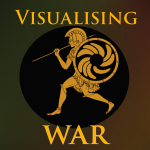How do war stories work? And what do they do to us? 
Join members of the Visualising War research group as we explore how war and battle get presented in art, text, film and music. With the help of expert guests, we unpick war stories from all sorts of different periods and places. And we ask how they the tales we tell and the pictures we paint of war influence us as individuals and shape the societies we live in.
Our interviewees include war reporters, artists, video-game designers, museum curators and theatre, film and documentary makers. We also talk to peace campaigners, NGOs and clinical psychologists, to find out how storytelling impacts their work with victims of conflict all around the world. And we interview serving soldiers, veterans, defence trainers and strategists, to find out what narratives of war flourish in their respective worlds and what influence they have.
In addition, we have a range of academics amongst our guests: experts in ancient war poetry, medieval religion, the ‘just war’ tradition, trends in memorialisation, militarism in popular culture, the history of grand strategy-making, human rights, international politics, the psychology of collective action, and processes of identify formation – among many other topics!
If you have ever wanted to think more about how war stories work and what they do to us, tune in here! And don’t forget to subscribe to the show so that you don’t miss an episode. Anyone requiring auto captions can access the podcast via YouTube. You can find a schedule of upcoming episodes here.
We are grateful to the University of St Andrews and the Institute of Classical Studies for their generous financial support of this podcast series.
Our podcast editor is Zofia Guertin; she is also the creative talent behind our logos and other art work.

Between war and peace: military involvement in peacebuilding – Visualising War and Peace
- Between war and peace: military involvement in peacebuilding
- Peace and Politics with Lord Jim Wallace
- Children, Childhoods and Child-Soldiering: critical lenses on war
- Transitional place-making: Palestinian refugee experiences in Lebanon
- AI-enabled military technologies: technology, ethics, trust, storytelling
- Visualising action: pre-battle speeches in ancient Judaism
- Conflict and Identity in ancient Judaism
- Visualising a Sustainable Future through Gaming with Mark Wong
- Peace activism in Israel and Palestine
- Visualising peace and conflict with J.R.R. Tolkien
View Visualising War podcasts on buzzsprout and subscribe via your favourite platform.
